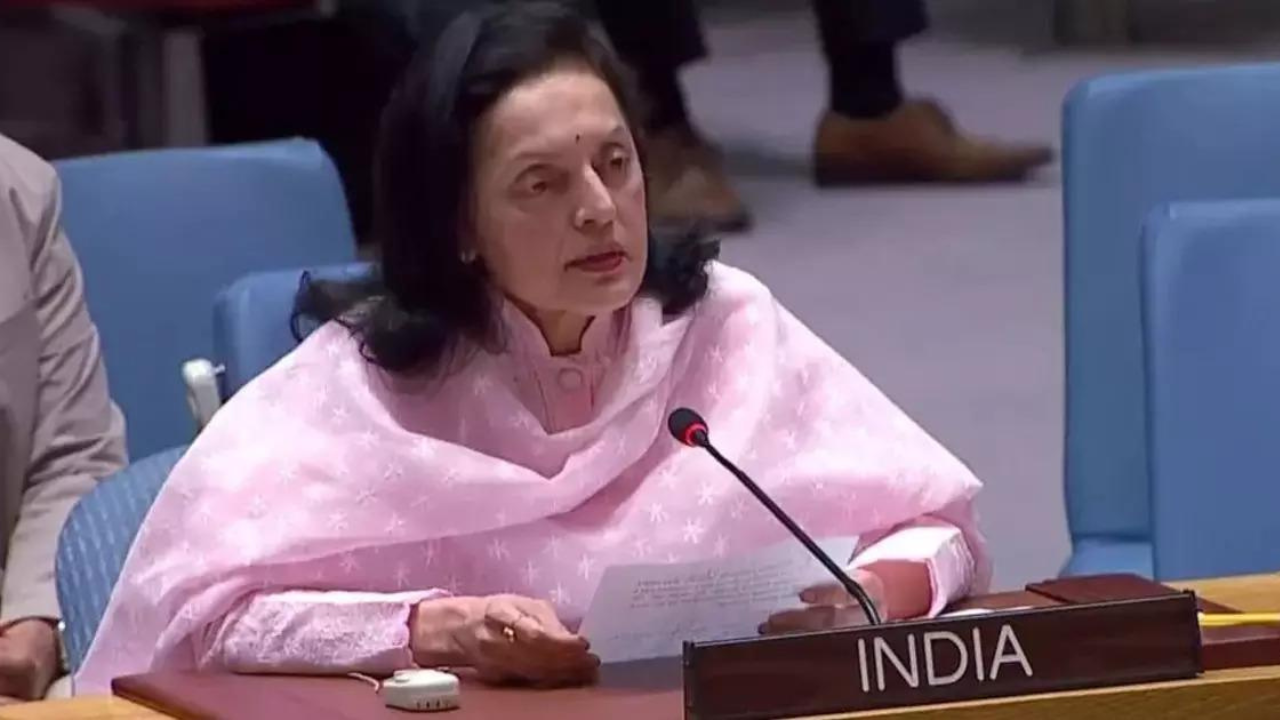NEW DELHI: India on Friday abstained from voting on a draft resolution ‘Measures to combat Islamophobia‘ in UN General Assembly. The resolution was introduced by Pakistan and co-sponsored by China.
India asserted that rather than singling out one religion, the prevalence of religiophobia against Hinduism, Buddhism, Sikhism and other faiths facing violence and discrimination must also be acknowledged.
Condemning acts motivated by anti-Semitism, Christianophobia and Islamophobia, India’s permanent representative to the UN Ambassador Ruchira Kamboj asserted that it is crucial to acknowledge that such phobias extend beyond Abrahamic religions.
“Clear evidence shows that over decades, followers of non-Abrahamic religions have also been affected by religiophobia. This has led to the emergence of contemporary forms of religiophobia, particularly anti-Hindu, anti-Buddhist and anti-Sikh sentiments,” she said, in an explanation of India’s position on the resolution.
India stressed that the adoption of the resolution should not establish a precedent that could result in numerous resolutions ‘dividing United Nations into religious camps’
“It is crucial for the UN to maintain its stance above such religious concerns, which have the potential to fragment us rather than unite us under the banner of peace and harmony, embracing the world as one global family,” Kamboj said.
“While the issue of Islamophobia is undoubtedly significant, we must acknowledge that other religions are also facing discrimination and violence. Allocating resources solely to combat Islamophobia, while neglecting similar challenges faced by other faiths, might inadvertently perpetuate a sense of exclusion and inequality,” she added.
Meanwhile, Kamboj also reminded UNGA that Hinduism, with over 1.2 billion followers, Buddhism with more than 535 million and Sikhism with over 30 million followers worldwide, are all subject to religiophobia.
“The destruction of the Bamiyan Buddhas, violations of gurudwara premises, massacres of Sikh pilgrims in gurudwaras, attacks on temples, and the glorification of breaking idols in temples all contribute to the rise of contemporary forms of religiophobia against non-Abrahamic religions,” she said.
Kamboj underlined that India stands against all forms of religiophobia, be it antisemitism, Christianophobia, or Islamophobia, as “we stand against all anti-Hindu, anti-Buddhist, and anti-Sikh sentiments.”
However, the 193-member General Assembly adopted the resolution introduced by Pakistan, with 115 nations voting in favour, none against and 44 abstentions, including India, Brazil, France, Germany, Italy, Ukraine and the UK.
The resolution condemned the incitement to discrimination, hostility or violence against Muslims as manifested in the increasing number of incidents of desecration of their holy book, attacks on mosques, sites and shrines and other acts of religious intolerance, negative stereotyping, hatred and violence against Muslims. It also requested UN Secretary-General Antonio Guterres to appoint a United Nations Special Envoy to combat Islamophobia.
India asserted that rather than singling out one religion, the prevalence of religiophobia against Hinduism, Buddhism, Sikhism and other faiths facing violence and discrimination must also be acknowledged.
Condemning acts motivated by anti-Semitism, Christianophobia and Islamophobia, India’s permanent representative to the UN Ambassador Ruchira Kamboj asserted that it is crucial to acknowledge that such phobias extend beyond Abrahamic religions.
“Clear evidence shows that over decades, followers of non-Abrahamic religions have also been affected by religiophobia. This has led to the emergence of contemporary forms of religiophobia, particularly anti-Hindu, anti-Buddhist and anti-Sikh sentiments,” she said, in an explanation of India’s position on the resolution.
India stressed that the adoption of the resolution should not establish a precedent that could result in numerous resolutions ‘dividing United Nations into religious camps’
“It is crucial for the UN to maintain its stance above such religious concerns, which have the potential to fragment us rather than unite us under the banner of peace and harmony, embracing the world as one global family,” Kamboj said.
“While the issue of Islamophobia is undoubtedly significant, we must acknowledge that other religions are also facing discrimination and violence. Allocating resources solely to combat Islamophobia, while neglecting similar challenges faced by other faiths, might inadvertently perpetuate a sense of exclusion and inequality,” she added.
Meanwhile, Kamboj also reminded UNGA that Hinduism, with over 1.2 billion followers, Buddhism with more than 535 million and Sikhism with over 30 million followers worldwide, are all subject to religiophobia.
“The destruction of the Bamiyan Buddhas, violations of gurudwara premises, massacres of Sikh pilgrims in gurudwaras, attacks on temples, and the glorification of breaking idols in temples all contribute to the rise of contemporary forms of religiophobia against non-Abrahamic religions,” she said.
Kamboj underlined that India stands against all forms of religiophobia, be it antisemitism, Christianophobia, or Islamophobia, as “we stand against all anti-Hindu, anti-Buddhist, and anti-Sikh sentiments.”
However, the 193-member General Assembly adopted the resolution introduced by Pakistan, with 115 nations voting in favour, none against and 44 abstentions, including India, Brazil, France, Germany, Italy, Ukraine and the UK.
The resolution condemned the incitement to discrimination, hostility or violence against Muslims as manifested in the increasing number of incidents of desecration of their holy book, attacks on mosques, sites and shrines and other acts of religious intolerance, negative stereotyping, hatred and violence against Muslims. It also requested UN Secretary-General Antonio Guterres to appoint a United Nations Special Envoy to combat Islamophobia.
